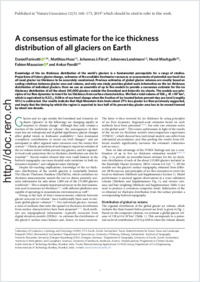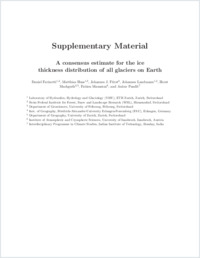A consensus estimate for the ice thickness distribution of all glaciers on Earth
- Farinotti, Daniel Laboratory of Hydraulics, Hydrology and Glaciology (VAW), ETH Zurich, Zurich, Switzerland - Swiss Federal Institute for Forest, Snow and Landscape Research (WSL), Birmensdorf, Switzerland
- Huss, Matthias Laboratory of Hydraulics, Hydrology and Glaciology (VAW), ETH Zurich, Zurich, Switzerland - Department of Geosciences, University of Fribourg, Fribourg, Switzerland
- Fürst, Johannes J. Institute of Geography, Friedrich-Alexander-University Erlangen-Nuremberg (FAU), Erlangen, Germany
- Landmann, Johannes Laboratory of Hydraulics, Hydrology and Glaciology (VAW), ETH Zurich, Zurich, Switzerland - Swiss Federal Institute for Forest, Snow and Landscape Research (WSL), Birmensdorf, Switzerland
- Machguth, Horst Department of Geosciences, University of Fribourg, Fribourg, Switzerland - Department of Geography, University of Zurich, Zurich, Switzerland
- Maussion, Fabien Institute of Atmospheric and Cryospheric Sciences, University of Innsbruck, Innsbruck, Austria
- Pandit, Ankur Interdisciplinary Programme in Climate Studies, Indian Institute of Technology Bombay, Mumbai, India - Hydro-Remote Sensing Applications (H-RSA) Group, Department of Civil Engineering, Indian Institute of Technology Bombay, Mumbai, India
-
2019
Published in:
- Nature Geoscience. - 2019, vol. 12, no. 3, p. 168–173
English
Knowledge of the ice thickness distribution of the world’s glaciers is a fundamental prerequisite for a range of studies. Projections of future glacier change, estimates of the available freshwater resources or assessments of potential sea-level rise all need glacier ice thickness to be accurately constrained. Previous estimates of global glacier volumes are mostly based on scaling relations between glacier area and volume, and only one study provides global-scale information on the ice thickness distribution of individual glaciers. Here we use an ensemble of up to five models to provide a consensus estimate for the ice thickness distribution of all the about 215,000 glaciers outside the Greenland and Antarctic ice sheets. The models use principles of ice flow dynamics to invert for ice thickness from surface characteristics. We find a total volume of 158 ± 41 × 103 km3, which is equivalent to 0.32 ± 0.08 m of sea-level change when the fraction of ice located below present-day sea level (roughly 15%) is subtracted. Our results indicate that High Mountain Asia hosts about 27% less glacier ice than previously suggested, and imply that the timing by which the region is expected to lose half of its present-day glacier area has to be moved forward by about one decade.
- Faculty
- Faculté des sciences et de médecine
- Department
- Département de Géosciences
- Language
-
- English
- Classification
- Hydrology
- License
- License undefined
- Identifiers
-
- RERO DOC 324672
- DOI 10.1038/s41561-019-0300-3
- Persistent URL
- https://folia.unifr.ch/unifr/documents/307744
Other files
Statistics
Document views: 133
File downloads:
- hus_cht.pdf: 1020
- hus_cht_sm.pdf: 283

